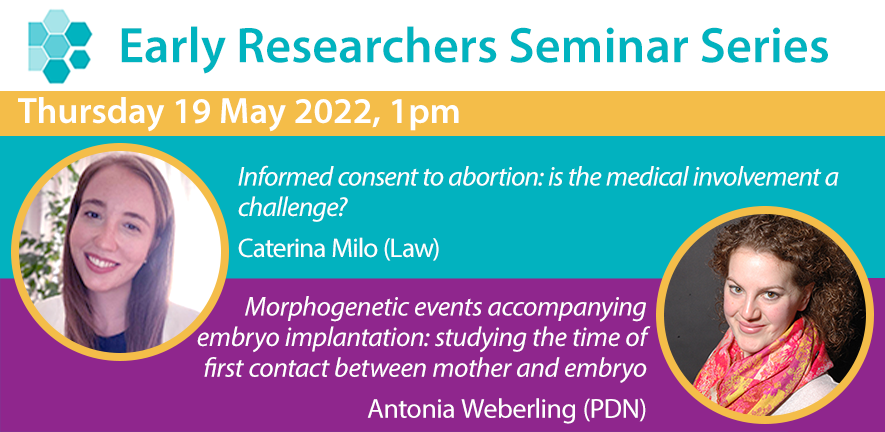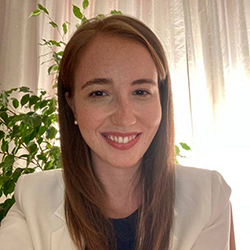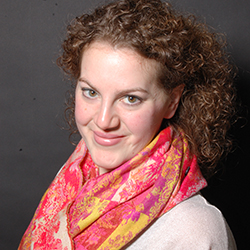
Thursday 19 May 2022, 1pm - 2pm
Informed consent to abortion: is the medical involvement a challenge?
Caterina Milo (Law)
Morphogenetic events accompanying embryo implantation: studying the time of first contact between mother and embryo
Antonia Weberling (PDN)
Chair: Kavya Kartik (Law)
Meeting link
Please register on Eventbrite to receive the Zoom meeting details (they will be available a couple of days before the seminar): https://erss-may-2022.eventbrite.co.uk
Speakers and abstracts
Informed consent to abortion: is the medical involvement a challenge?
Caterina Milo (Law)
This paper discusses patients’ right to information disclosure (IC) in the abortion context, and the often-contested relationship with the role played by clinicians. The latter is often framed as abusive and ill-placed in the abortion context. This paper will conversely offer reasons why a relationship of mutual trust and collaboration between clinicians and patients can be a positive channel for the protection of IC. Starting from the Supreme court ruling in Montgomery, this paper will firstly offer a theoretical framework upon which the safeguard of IC can be construed and then show how this can be translated in the abortion context. It will suggest that the delivery of a good quality of care is strictly interconnected with a reframed understanding of the contributions of both clinicians’ and women’s. Medical partnership and patients' autonomy can and should go together.
Caterina Milo is Assistant professor and Fellow in Law at Robinson College, University of Cambridge. Before joining Robinson, she was Lecturer in Law at Exeter Law School. In 2021, she earned her PhD in Health Law at Durham Law School. She is Fellow of the Higher Education Academy UK. Her research interests lie in the area of health law and ethics, particularly informed consent, doctor-patient relationship and reproductive ethics.
Morphogenetic events accompanying embryo implantation: studying the time of first contact between mother and embryo
Antonia Weberling (PDN)
Implantation is a hallmark of mammalian embryogenesis during which embryos establish their contacts with the maternal endometrium, remodel into their post-implantation configuration, and undertake growth and differentiation. In this talk, I will focus on two of my PhD projects which show how the embryonic epiblast lineage is regulated by the surrounding extraembryonic lineages. We found that the first extraembryonic lineage, the trophectoderm, is the key regulator for remodelling the embryonic epiblast upon implantation: Through exerting physical force on the epiblast, the polar trophectoderm mediates epiblast transformation from an oval into the cup shape. Simultaneously, the second extraembryonic lineage, the primitive endoderm, differentiates into the visceral endoderm. Through single cell sequencing of E5.0 embryos, we could characterise the primitive to visceral endoderm transition. By assessing Hnf1b-/- embryos, which degenerate upon implantation due to visceral endoderm differentiation failure, we uncovered a previously unknown interaction between epiblast and visceral endoderm required for epiblast post-implantation survival. Taken together, these projects illustrate the intricate relationship of the epiblast and the extra-embryonic lineages to ensure correct embryo morphogenesis and survival at peri-implantation stages.
Antonia Weberling is currently finishing her PhD in Developmental Biology in the group of Magdalena Zernicka-Goetz (Department of PDN, Cambridge, and Caltech, USA). Her research focusses on the timepoints of implantation, during which mammalian embryos undergo a series of remodelling events in both the embryonic and extra-embryonic lineages. In particular, she studied the blastocyst to egg cylinder transition in mouse embryos focussing at overall tissue shapes as well as differentiation events happening in the different lineages and compared this to human embryos.
The Early Researchers Seminar Series (ERSS) is a platform for PhD Students and early career researchers (ECRs) at the University of Cambridge with research foci on reproduction to share and discuss their research with other academics from a range of disciplines also researching reproduction at the University. Seminars are held on Zoom on the third Thursday of every month, 1pm - 2pm. For more information, and for the full 2021 - 2022 programme, please see the main ERSS page.



